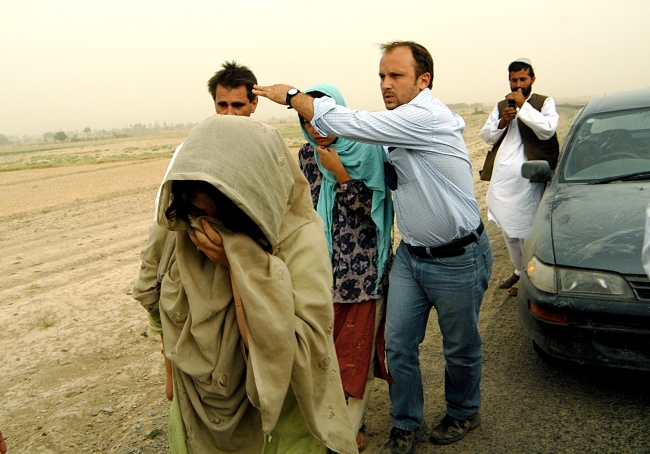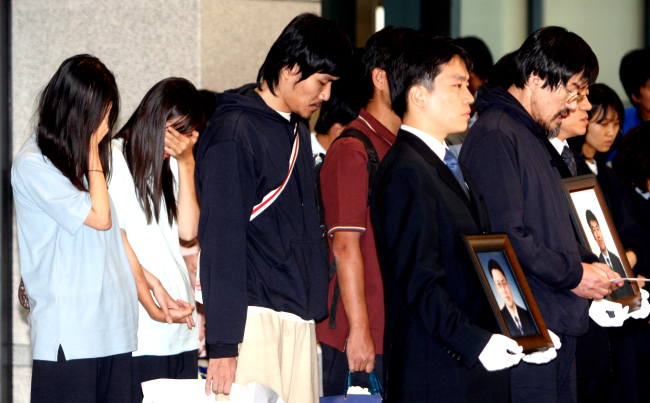
Kim Jin-dae hoped he could persuade the Ministry of Foreign Affairs to lift its ban on travel to countries it deemed as too dangerous for Korean passport holders, but he knew better.
Instead, the 52-year-old pastor discussed with diplomats “unofficial” Christian missionary activity in several Muslim and communist countries in a meeting on April 17, including one man detained for two months in Libya before being deported back to Korea in early April.
Korea has banned its citizens since 2007 from traveling to countries the government determines are too dangerous ― currently, there are five: Yemen, Syria, Afghanistan, Somalia and Iraq.
Until now, Christian missionaries have failed to persuade the government to lift its ban. The Foreign Ministry is scheduled to review its travel ban this spring and summer.
Kim met with officials at the Ministry of Foreign Affairs in his role as general director of Korea Crisis Management Service, a nonprofit launched in the wake of the kidnapping of 23 Korean Christians doing missionary work in war-torn Afghanistan in July 2007.
The hostage crisis gripped the public’s attention for weeks until the ordeal was finally resolved in mid-August.
Negotiations did eventually free the hostages, but not without a grisly toll; 42-year-old Bae Hyeong-gyu, a Saemmul Presbyterian Church pastor, and 29-year-old Shim Seong-min were shot dead.
Instead, the 52-year-old pastor discussed with diplomats “unofficial” Christian missionary activity in several Muslim and communist countries in a meeting on April 17, including one man detained for two months in Libya before being deported back to Korea in early April.
Korea has banned its citizens since 2007 from traveling to countries the government determines are too dangerous ― currently, there are five: Yemen, Syria, Afghanistan, Somalia and Iraq.
Until now, Christian missionaries have failed to persuade the government to lift its ban. The Foreign Ministry is scheduled to review its travel ban this spring and summer.
Kim met with officials at the Ministry of Foreign Affairs in his role as general director of Korea Crisis Management Service, a nonprofit launched in the wake of the kidnapping of 23 Korean Christians doing missionary work in war-torn Afghanistan in July 2007.
The hostage crisis gripped the public’s attention for weeks until the ordeal was finally resolved in mid-August.
Negotiations did eventually free the hostages, but not without a grisly toll; 42-year-old Bae Hyeong-gyu, a Saemmul Presbyterian Church pastor, and 29-year-old Shim Seong-min were shot dead.

It was widely reported at the time that the government paid the Taliban kidnappers a ransom of $20 million to free the remaining 16 women and five men when the Taliban said as much, along with promises Korea would follow through with plans to withdraw its contribution to the NATO-led international coalition fighting in Afghanistan by the end of 2007. The government continues to refute the claims.
The government’s failure to prevail over the hostage takers caused national embarrassment and public debate over Christian missionary activity in such restive nations.
The public was also fed up with what appeared to be Koreans deliberately putting themselves in harm’s way by brazen proselytizing in deeply conservative and traditional Islamic countries.
Under pressure to act, the government adopted its policy of prohibiting its nationals from visiting nations deemed too dangerous.
The Ministry of Foreign Affairs first banned travel to Afghanistan, Somalia and Iraq from Aug. 7, 2007.
Four years later, it expanded the prohibition. In 2011, Libya, Syria and Yemen were added to the list. Libya was removed from the list in December the same year.
A 12-member committee headed up by Second Vice Minister of Foreign Affairs Cho Tae-yul reviews travel conditions and makes recommendations. The committee convened 22 times since August 2007, including four times last year and most recently on Jan. 25.
The Yemen travel ban is up for review in late May. The bans on Iraq and Syria will be reviewed in July and Somalia and Afghanistan in August, according to the ministry.
The government had been preparing to institute its restrictive policy since 2004 when Kim Sun-il, an employee of a company supplying the U.S. military in Iraq, was kidnapped and killed in a horrific beheading captured on video.
Kim was described as a devout Christian who studied Arabic at Hankuk University of Foreign Studies in Seoul. His parents said he went to Iraq because he dreamed of becoming a missionary in the Arab world, according to a news report by the Chosun Ilbo.
“Many missionaries want to go to these Muslim countries,” Kim of KCMS said. “They have a love for Muslim people and a calling to preach the gospel.”
Some 25,000 Korean Christians are engaged in overseas missionary work, according to a team manager at the Korea World Missions Association. That is about the same number from the United States. Korean missionaries work in more than 170 countries around the world.
Korean executives from the Korea National Oil Corporation and Korea Gas Corporation who frequently travel between Iraq and Korea described stories they heard of missionaries residing in neighboring Jordan, waiting for the Iraq travel ban to be lifted so they can reenter the country to evangelize.
“(The missionaries) are just waiting in Jordan for a chance to reenter Iraq,” one executive said.
Lee Jae-kyoung, chairman of Foreign Missions Board, said he wants the government to appreciate the humanitarian work Christians do in countries like Afghanistan and Iraq. “The government should find room for flexibility for missionaries,” he said.
But a foreign ministry official insisted the government is obligated to protect its people from danger.
“There is trouble out in the world. It could be anywhere. The Korean government should promote the idea of preparing people to deal with trouble when it arises. We should educate and prepare people on how to handle themselves in dangerous places,” Kim of KCMS said.
“The Korean constitution obligates the government to take measures to ensure the protection of its citizens. The duty of the government to protect its citizens is greater than the rights of a few NGOs to go abroad for missionary activities,” said Chun Woo-seung, second secretary at the Foreign Ministry’s Overseas Korean National Protection Division.
The travel ban to Afghanistan and Somalia is reviewed annually, Iraq and Syria twice a year and, in the case of Yemen, more frequently still. Those who do not comply could face punishment of up to one year in prison or pay a fine of 3 million won.
KCMS was founded in part at the government’s request. The nonprofit body trains missionaries working in countries with extreme crime or civil unrest to avoid dangerous situations and, if confronted with trouble, how to get out of it.
KCMS is publishing a massive 2,000-page report this week on the 2007 hostage crisis in Afghanistan which he said will be instructive to avoid future incidents, Kim said.
Critics of the travel ban say democratic nations are not supposed to restrict the movement of their citizens. Aside from the United States with its restrictions on travel to Cuba, Korea is the only nation in the OECD to ban its citizens from traveling to specific countries.
The policy was challenged in the Constitutional Court in June 2008. The government prevailed with the court ruling the government has an obligation to ensure the safety of its citizens here and abroad.
The court ruled that obligation can be inferred from Articles 2, 10 and 14 of Korea’s constitution. The scope, covering five countries, and its duration being reviewed periodically means the government’s prohibition was reasonable.
But envoys from two of those countries, Iraq and Afghanistan, do not agree and are urging the Seoul government to lift the ban. They routinely communicate with the Foreign Affairs Ministry on the issue.
The Afghan and Iraqi embassies here said that, while they understand the government’s concern, they can take adequate security precautions working with Koreans visiting their countries.
“They need to ease restrictions on businesspeople keen to invest in Afghanistan,” said Afghan Ambassador to Korea Yunos Farman.
The ministry requires documentation proving security measures will be taken in Afghanistan before issuing a waiver. It takes two to three weeks to obtain a waiver from the travel ban for business people, Farman said.
“This travel ban is crippling the business community,” said Iraqi Ambassador to Korea Khalil Al Mosawi. “They have to get permission from the Ministry of Foreign Affairs which requires unnecessary and costly security measures.”
“Korea could get 20 to 25 percent of a trillion dollars worth of projects,” Al Mosawi said. “We had direct flights in the 1980s. They should also reinstate direct flights,” he said
Al Mosawi said such costs include hiring armed security guards and armored vehicles which can run around $6,000 a day.
“Things have changed since 2004. The Europeans and Americans do not place these kinds of restrictions on travel.”
By Philip Iglauer (ephilip2011@heraldcorp.com)
-
Articles by Korea Herald








![[Graphic News] More Koreans say they plan long-distance trips this year](http://res.heraldm.com/phpwas/restmb_idxmake.php?idx=644&simg=/content/image/2024/04/17/20240417050828_0.gif&u=)
![[KH Explains] Hyundai's full hybrid edge to pay off amid slow transition to pure EVs](http://res.heraldm.com/phpwas/restmb_idxmake.php?idx=644&simg=/content/image/2024/04/18/20240418050645_0.jpg&u=20240419100350)






![[From the Scene] Monks, Buddhists hail return of remains of Buddhas](http://res.heraldm.com/phpwas/restmb_idxmake.php?idx=652&simg=/content/image/2024/04/19/20240419050617_0.jpg&u=20240419175937)

![[KH Explains] Hyundai's full hybrid edge to pay off amid slow transition to pure EVs](http://res.heraldm.com/phpwas/restmb_idxmake.php?idx=652&simg=/content/image/2024/04/18/20240418050645_0.jpg&u=20240419100350)

![[Today’s K-pop] Illit drops debut single remix](http://res.heraldm.com/phpwas/restmb_idxmake.php?idx=642&simg=/content/image/2024/04/19/20240419050612_0.jpg&u=)